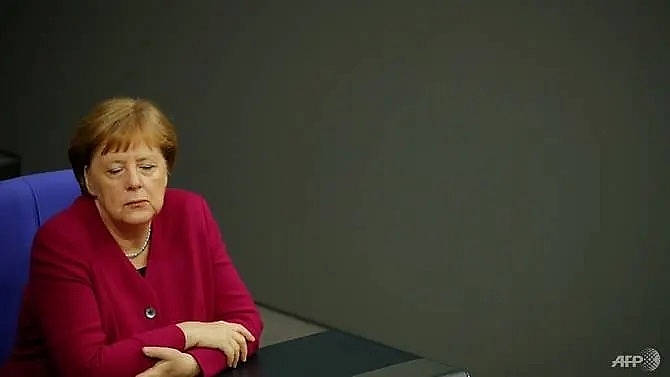Merkel denies coalition instability despite SPD crisis
 |
| Merkel has said her government will fulfil its mandate. (Photo: AFP/Odd Andersen) |
The centre-left Social Democratic Party (SPD) sank into chaos after its leader Andrea Nahles said in a shock announcement Sunday that she was quitting her party's top jobs following an European election drubbing a week earlier.
As the SPD scrambled for a new leader, the chief of Merkel's CDU party conceded that the centre-left coalition partner could end up deciding whether Germany goes to the polls before the end of the electoral term in 2021.
"We are ready to keep this coalition going. How the SPD behaves is its decision," Annegret Kramp-Karrenbauer told journalists following crisis talks within her centre-right party.
She warned however that given the international challenges, it would be "anything but productive if Germany were to go into a government crisis or a lengthy election campaign".
Denying that the issue of snap elections was broached in Monday's talks, she added however that "you can be certain that the CDU is prepared for whatever comes or does not come".
At a separate press conference, Merkel batted away speculation that her coalition was crumbling.
Insisting that she did "not see a signal of instability", Merkel said: "At the moment I only see that the SPD has reached specific decisions which I can't say would hinder us from working."
RATINGS IN FREE-FALL
The SPD leadership crisis could not have come at a worse time for the CDU, which has itself been struggling to halt a haemorrhage of voters as the younger generation shuns it in droves for the Greens.
Both the CDU and the SPD were given a drubbing at the polls on May 26, with voters handing them record low scores at European elections.
A survey on Saturday also showed support for the coalition partners melting away, with the Greens overtaking Merkel's CDU-CSU alliance for the first time while also enjoying a 15 percentage point lead over the SPD.
Seeking to stabilise the listing ship, the SPD on Monday named a trio - regional party leader Thorsten Schaefer-Guembel as well as state premiers Manuela Schwesig and Malu Dreyer - as caretaker leaders until its next congress, when a new chief would be elected.
It also set Jun 24 to decide the next steps to be taken by the party, including when to hold a congress to elect a new leader.
The SPD, Germany's oldest party, had initially planned to re-examine the alliance with Merkel's centre-right CDU-CSU alliance in the autumn - half-way through the four-year mandate.
But with a free-fall in its ratings unending, the SPD could still preemptively put an end to the alliance with Merkel's Christian Democrats, which had been fraught from the start.
Wounded by an election rout in 2017, the SPD had initially sought to go into opposition, but was reluctantly coaxed into renewing a partnership with Merkel.
Many within the party however remained wary of continuing to govern in Merkel's shadow, and the coalition has lurched from crisis to crisis.
'MEASURES US BY THIS'
The latest crisis has amplified voices within both the SPD and the CDU for the parties to part ways.
Harald Christ of the SPD's business leaders forum said "Nahles stands for the existence of the GroKo - whose stability is now in question."
"In my view what comes next is the end of the GroKo - everything else leads nowhere," he told Bild daily, using the German shortform for grand coalition.
The deputy leader of the CDU-CSU parliamentary group, Carsten Linnemann, also warned in an interview with RedaktionsNetzwerk Deutschland newspaper group that "if we are unable to progress with the SPD, then we should draw a line under this and ask ourselves if continuing with the GroKo still makes sense."
But other voices pleaded for more time for the coalition to deliver on its pledges and win back disillusioned voters with policy gains.
A leading SPD centrist, Johannes Kahrs, pointed to a plan to push through a climate protection law before the next elections, saying that "the people can, should and will measure us by this".
What the stars mean:
★ Poor ★ ★ Promising ★★★ Good ★★★★ Very good ★★★★★ Exceptional
 Tag:
Tag:
Related Contents
Latest News
More News
- France supports Vietnam’s growing role in international arena: French Ambassador (January 25, 2026 | 10:11)
- Foreign leaders extend congratulations to Party General Secretary To Lam (January 25, 2026 | 10:01)
- Russian President congratulates Vietnamese Party leader during phone talks (January 25, 2026 | 09:58)
- Worldwide congratulations underscore confidence in Vietnam’s 14th Party Congress (January 23, 2026 | 09:02)
- Political parties, organisations, int’l friends send congratulations to 14th National Party Congress (January 22, 2026 | 09:33)
- 14th National Party Congress: Japanese media highlight Vietnam’s growth targets (January 21, 2026 | 09:46)
- 14th National Party Congress: Driving force for Vietnam to continue renewal, innovation, breakthroughs (January 21, 2026 | 09:42)
- Vietnam remains spiritual support for progressive forces: Colombian party leader (January 21, 2026 | 08:00)
- Int'l media provides large coverage of 14th National Party Congress's first working day (January 20, 2026 | 09:09)
- Vietnamese firms win top honours at ASEAN Digital Awards (January 16, 2026 | 16:45)






















 Mobile Version
Mobile Version